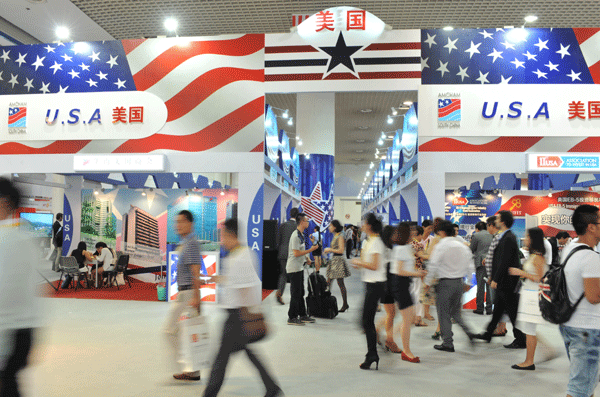Visa change may boost tourism to the US
By Wang Qian (China Daily) Updated: 2014-11-28 07:36
|
 |
|
The US exhibition zone was one of the most popular attractions at the China International Fair for Investment and Trade held in Xiamen, Fujian province, on Sept 8. Many booths were promoting the EB-5 Visa Program, which requires a minimum investment of $500,000 and the creation of at least 10 full-time jobs if a person wants to obtain permanent residence in the US. [Photo/Xinhua] |
Since she gave birth to her first child in the United States in 2011, Wu Na, a 34-year-old in Beijing, has been considering "buying" her way into the country.
However, her US entry ticket - the EB-5 Visa Program - requires a minimum investment of $500,000 and the creation of at least 10 full-time jobs.
Under the program, if foreign investors finance certain commercial projects and fulfill a number of requirements, they and their families can obtain permanent residence in the country, according to the US Citizenship and Immigration Services.
Wu's husband owns a factory in Hebei province. The business generates annual revenue of millions of yuan, but the family is still hesitant about applying for so-called investment immigration because of the risks associated with such projects and the uncertainties inherent in living in a strange country.
So when US President Barack Obama announced a deal to extend visas for Chinese visitors to the US for up to 10 years, Wu was flooded with new hopes for her "American dream".
"The new visa policy means I can go to the US anytime I want within a 10-year period, and gain comprehensive knowledge about the country before making a decision about living there," she said with a smile.
Under the new bilateral policy, which came into effect on Nov 12, China and the US have extended the duration of multiple-entry, short-term tourist and business visas from one year to 10, and student visas have been extended from one year to five. Before the change, citizens of both counties had to renew their business, tourist, and student visas annually.
Yang Ping, a lawyer with the Global Investment Immigration Lawyers Association, said the new policy is good news for Chinese investors who are considering emigrating because it will help them make a rational choice.
However, he said, the new visa program doesn't mean the standards of eligibility for a US visa will be loosened, and the duration of each visit will still be determined by US Customs and Border Protection officers.
"As a result, the new visa program is not that helpful to people who intend to stay in the US for a long time, so more Chinese will choose investment immigration to the US," Yang said.
The latest statistics show that of the 10,692 EB-5 visas issued from October 2013 and September, 9,128 went to Chinese nationals.
John Deyong Hu, a lawyer with The Law Office of Hu and Associates, said most of his clients who opt for investment immigration cite better education for their children, and environmental factors such as safer food and cleaner air and water as the prime reasons, and these factors will not be influenced by the change in the visa policy.
- Visa changes for Chinese visitors unlock opportunities
- Working holiday visa is popular among Chinese
- Zimbabwe mulls visa relaxation for Chinese tourists
- Singapore to halt walk-in visa applications in China
- Chinese students benefit from new visa policy
- Fujian launches visa violation investigation throughout the province
- 'Thousands stand to benefit' from Sino-US visa accord
- Visa deal more than just jobs and trade
- Govt encourages people to work 4.5 days a week
- Action to be taken as HIV cases among students rise
- Debate grows over reproductive rights
- Country's first bishop ordained in 3 years
- China builds Tibetan Buddhism academy in Chengdu
- Authorities require reporting of HIV infections at schools
- Typhoon Soudelor kills 14 in East China
- Police crack down on overseas gambling site
- Debate over death penalty for child traffickers goes on
- Beijing to tighten mail security for war anniversary







